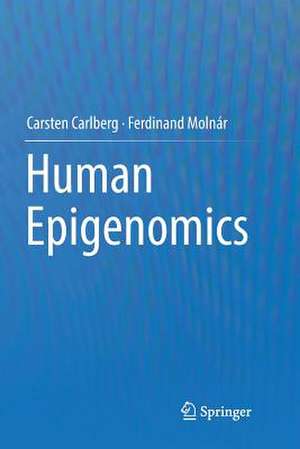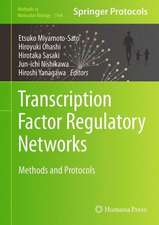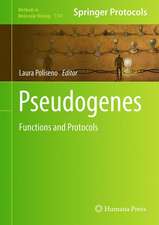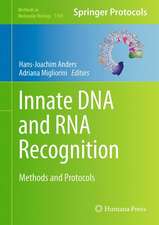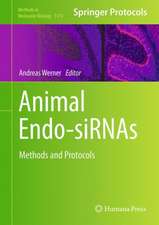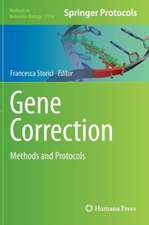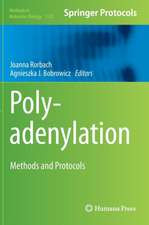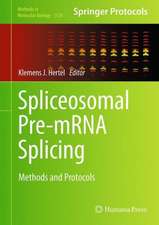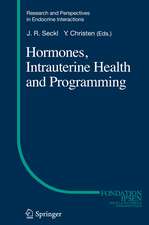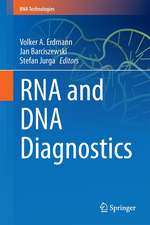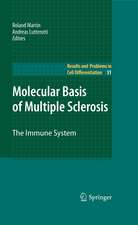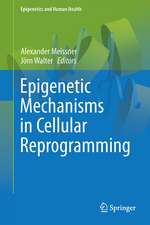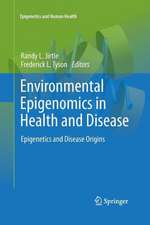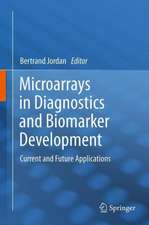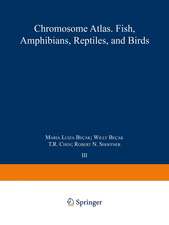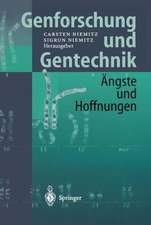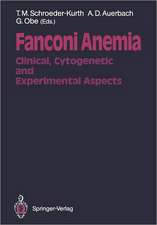Human Epigenomics
Autor Carsten Carlberg, Ferdinand Molnáren Limba Engleză Paperback – 30 ian 2019
This book aims to summarize, in a condensed form, the role of epigenomics in defining chromatin states that are representative of active genes (euchromatin) and repressed genes (heterochromatin). Moreover, this book discusses the principles of gene regulation, chromatin stability, genomic imprinting and the reversibility of DNA methylation and histone modifications. This information should enable a better understanding of cell type identities and will provide new directions for studies of, for example, cellular reprograming, the response of chromatin to environmental signals and epigenetic therapies that can improve or restore human health. In order to facilitate the latter, we favor a high figure-to-text ratio following the rule “a picture tells more than thousand words”.
The content of the book is based on the lecture course “Molecular Medicine and Genetics” that is given by one of us (C. Carlberg) in different forms since 2002 at the University of Eastern Finland in Kuopio. Thematically, this book is located between our textbooks “Mechanisms of Gene Regulation” (ISBN 978-94-017-7741-4) and “Nutrigenomics” (ISBN 978-3-319-30415-1), studying of which may also be interesting to our readers. The book is sub-divided into three sections and 13 chapters. Following the Introduction (section A), section B will explain the molecularbasis of epigenomics, while section C will provide examples for the impact of epigenomics in human health and disease. The lecture course is primarily designed for Master level students of biomedicine, but is also frequented by PhD students as well as by students of other bioscience disciplines.
Besides its value as a textbook, Human Epigenomics will be a useful reference for individuals working in biomedicine.
| Toate formatele și edițiile | Preț | Express |
|---|---|---|
| Paperback (1) | 464.84 lei 6-8 săpt. | |
| Springer Nature Singapore – 30 ian 2019 | 464.84 lei 6-8 săpt. | |
| Hardback (1) | 661.01 lei 6-8 săpt. | |
| Springer Nature Singapore – 12 feb 2018 | 661.01 lei 6-8 săpt. |
Preț: 464.84 lei
Preț vechi: 489.30 lei
-5% Nou
Puncte Express: 697
Preț estimativ în valută:
88.96€ • 92.63$ • 75.18£
88.96€ • 92.63$ • 75.18£
Carte tipărită la comandă
Livrare economică 07-21 martie
Preluare comenzi: 021 569.72.76
Specificații
ISBN-13: 9789811356605
ISBN-10: 9811356602
Pagini: 223
Ilustrații: XIX, 223 p. 120 illus. in color.
Dimensiuni: 155 x 235 mm
Greutate: 0.45 kg
Ediția:Softcover reprint of the original 1st ed. 2018
Editura: Springer Nature Singapore
Colecția Springer
Locul publicării:Singapore, Singapore
ISBN-10: 9811356602
Pagini: 223
Ilustrații: XIX, 223 p. 120 illus. in color.
Dimensiuni: 155 x 235 mm
Greutate: 0.45 kg
Ediția:Softcover reprint of the original 1st ed. 2018
Editura: Springer Nature Singapore
Colecția Springer
Locul publicării:Singapore, Singapore
Cuprins
What is epigenomics?.- Methods and applications of epigenomics.- The structure of chromatin.- DNA methylation.- The histone code.- Chromatin modifiers.- Chromatin remodelers and organizers.- Embryogenesis and cellular differentiation.- Population epigenomics and aging.- Cancer epigenomics.- Neuroepigenetics.- Epigenomics of immune function.- Nutritional epigenomics.
Notă biografică
Prof. Carsten Carlberg: Professor for biochemistry at the School of Medicine, Institute of Biomedicine at the University of Eastern Finland. The main research interests of Prof. Carlberg are (epi)genomics of nuclear receptors and their ligands with special focus on vitamin D. So far he published more than 200 papers (H-index 54). Since 2001 he is lecturing yearly courses on epigenetics and gene regulation, which are the basis of this textbook. Together with Dr. Molnár he also published the Springer textbooks "Mechanisms of gene regulation" and “Nutrigenomics”.
Dr. Ferdinand Molnár: Project researcher at the School of Medicine, Institute of Biomedicine at the University of Eastern Finland. The main research interests of Dr. Molnár are the molecular structure of nuclear receptor proteins and their natural and synthetic ligands, on which he published more than 27 papers (H-index 17). Together with Prof. Carlberg he published the Springer textbooks "Mechanisms of gene regulation" and “Nutrigenomics”.
Dr. Ferdinand Molnár: Project researcher at the School of Medicine, Institute of Biomedicine at the University of Eastern Finland. The main research interests of Dr. Molnár are the molecular structure of nuclear receptor proteins and their natural and synthetic ligands, on which he published more than 27 papers (H-index 17). Together with Prof. Carlberg he published the Springer textbooks "Mechanisms of gene regulation" and “Nutrigenomics”.
Textul de pe ultima copertă
The term epigenetics describes regulatory and information storing mechanisms of specific genes that do not involve any change of their DNA sequence. Epigenetics is closely related to the extensively folded state, in which the genome is packaged, known as chromatin. New genomic tools nowadays allow the genome-wide assessment of, for example, chromatin states and DNA modifications, and led to the discovery of unexpected new epigenetic principles, such as epigenomic memory. This was the start of the field of epigenomics, the relation of which to human health and disease is discussed in this textbook.
This book aims to summarize, in a condensed form, the role of epigenomics in defining chromatin states that are representative of active genes (euchromatin) and repressed genes (heterochromatin). Moreover, this book discusses the principles of gene regulation, chromatin stability, genomic imprinting and the reversibility of DNA methylation and histone modifications. This information should enable a better understanding of cell type identities and will provide new directions for studies of, for example, cellular reprograming, the response of chromatin to environmental signals and epigenetic therapies that can improve or restore human health. In order to facilitate the latter, we favor a high figure-to-text ratio following the rule “a picture tells more than thousand words”.
The content of the book is based on the lecture course “Molecular Medicine and Genetics” that is given by one of us (C. Carlberg) in different forms since 2002 at the University of Eastern Finland in Kuopio. Thematically, this book is located between our textbooks “Mechanisms of Gene Regulation” (ISBN 978-94-017-7741-4) and “Nutrigenomics” (ISBN 978-3-319-30415-1), studying of which may also be interesting to our readers. The book is sub-divided into three sections and 13 chapters. Following the Introduction (section A), section B will explain the molecularbasis of epigenomics, while section C will provide examples for the impact of epigenomics in human health and disease. The lecture course is primarily designed for Master level students of biomedicine, but is also frequented by PhD students as well as by students of other bioscience disciplines.
Besides its value as a textbook, Human Epigenomics will be a usefull reference for individuals working in biomedicine.
This book aims to summarize, in a condensed form, the role of epigenomics in defining chromatin states that are representative of active genes (euchromatin) and repressed genes (heterochromatin). Moreover, this book discusses the principles of gene regulation, chromatin stability, genomic imprinting and the reversibility of DNA methylation and histone modifications. This information should enable a better understanding of cell type identities and will provide new directions for studies of, for example, cellular reprograming, the response of chromatin to environmental signals and epigenetic therapies that can improve or restore human health. In order to facilitate the latter, we favor a high figure-to-text ratio following the rule “a picture tells more than thousand words”.
The content of the book is based on the lecture course “Molecular Medicine and Genetics” that is given by one of us (C. Carlberg) in different forms since 2002 at the University of Eastern Finland in Kuopio. Thematically, this book is located between our textbooks “Mechanisms of Gene Regulation” (ISBN 978-94-017-7741-4) and “Nutrigenomics” (ISBN 978-3-319-30415-1), studying of which may also be interesting to our readers. The book is sub-divided into three sections and 13 chapters. Following the Introduction (section A), section B will explain the molecularbasis of epigenomics, while section C will provide examples for the impact of epigenomics in human health and disease. The lecture course is primarily designed for Master level students of biomedicine, but is also frequented by PhD students as well as by students of other bioscience disciplines.
Besides its value as a textbook, Human Epigenomics will be a usefull reference for individuals working in biomedicine.
Caracteristici
Is the first textbook on epigenomics with a clear focus on human Links epigenomics to numerous disciplines, such as embryogenesis, nutrition and neuroscience Discusses impact of epigenomics in health and disease Has a high ratio of figures to text
